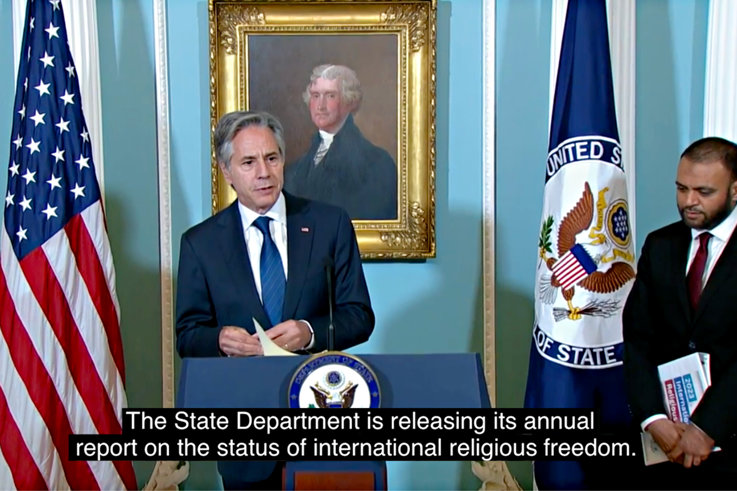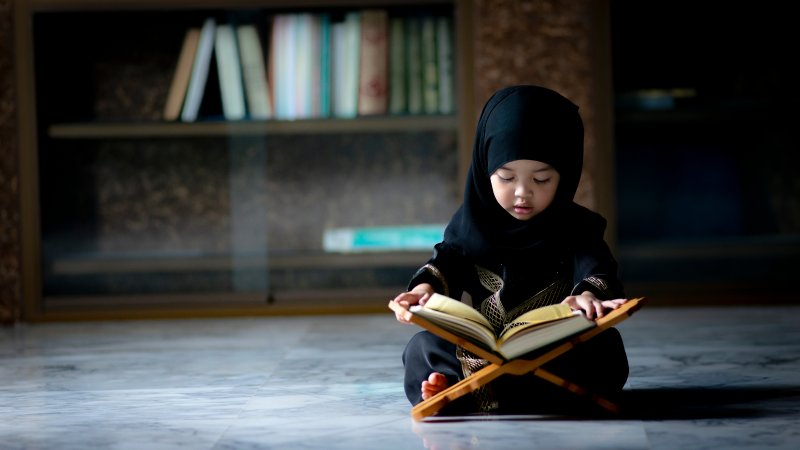
-
HOME
-
WHAT IS STANDOur Mission Our Values Our Help Contact
-
WHAT WE FIGHT FORReligious Freedom Religious Literacy Equality & Human Rights Inclusion & Respect Free Speech Responsible Journalism Corporate Accountability
-
RESOURCESExpert Studies Landmark Decisions White Papers FAQs David Miscavige Religious Freedom Resource Center Freedom of Religion & Human Rights Topic Index Priest-Penitent Privilege Islamophobia
-
HATE MONITORBiased Media Propagandists Hatemongers False Experts Hate Monitor Blog
-
NEWSROOMNews Media Watch Videos Blog
-
TAKE ACTIONCombat Hate & Discrimination Champion Freedom of Religion Demand Accountability
Secretary of State Releases Annual Report on International Religious Freedom
On June 26, Secretary of State Antony J. Blinken released the State Department’s annual International Religious Freedom Report. The Secretary’s brief comments, delivered from the State Department to an audience of press and religious freedom advocates, summarized the report and emphasized the importance of religious freedom to America and the world.

“Protecting this universal right empowers people to express themselves, to live up to their full potential, to contribute fully to their communities,” Secretary Blinken said. “Yet today religious freedom is still not respected for millions of people around the world.”
Blinken cited a recent Pew Research Center study revealing that government restrictions on religion have reached their highest level since 2007, when Pew began tracking that category.
“We know the powerful change that’s possible when governments and civil society come together to stand up for human rights.”
Members in every global region endure religion-based violence and discrimination for their beliefs, Secretary Blinken explained. Houses of worship are being shuttered, communities displaced, and individuals beaten, harassed, imprisoned or worse because of their faith. Certain types of religious dress are banned in some nations while, in others, religious dress is enforced. Some countries reach beyond their borders to target individuals and groups based solely on their religion, while others allow vigilante groups and extremists within to use blasphemy laws as an excuse to wreak violence on minority religions.
The Secretary also cited increases in Islamophobia and antisemitism before shifting to a more hopeful note.
Secretary Blinken pointed out all those working hard around the world to protect religious freedom and highlighted specific nations that are taking steps to defend and promote this fundamental human right.
Last November, for example, the Czech Republic brought faith and civil society leaders together from some 60 countries to share ways to push back against authoritarian governments that abuse religious freedom; Saudi Arabia is removing hateful language against minorities from its public school textbooks and Germany is working with survivors to prosecute ISIS fighters who carried out genocidal programs against religious minorities in Syria and Iraq.
The Secretary added that, in the past year, 47 prisoners of faith have been released, thousands of human rights defenders have been trained to document religious freedom violations, and a new initiative has gone into effect to train diplomats from abroad who are advocates of religious liberty.
“Ultimately,” he said, “this work is about protecting an essential part of what it means to be human: The ability to explore something bigger than ourselves, to decide on our own what we believe or don’t believe without fear of repression. The right to choose what we believe also allows us to learn from those who are different than us and celebrate all that we have in common.”
Concluding, Secretary Blinken quoted religious scholar Huston Smith: “If we take the world’s enduring religions at their best, we discover the distilled wisdom of the human race.”
The Secretary of State was followed by Rashad Hussain, the United States Ambassador-at-Large for International Religious Freedom.
“In this report’s pages,” he said, “are the stories of thousands of individuals who are in each way trying to live according to their own conscience. We find the stories of parents, sons and daughters, brothers and sisters, people from every walk of life—lawyers and artists, students and teachers—just far too many people that are facing repressive regimes.”
Like Secretary Blinken, Ambassador Hussain went into detail on the abuse of religious minorities and those who advocate for them. He spoke of India, where mobs attacked Christian communities while police stood by and watched, before arresting not the perpetrators but the victims on the charge of attempted religious conversion.
Ambassador Hussain also acknowledged several religious freedom advocates from different nations who were present in the room—individuals who survived torture and imprisonment to speak out for what they believed.
Like Secretary Blinken, Ambassador Hussain ended his remarks on a hopeful note: “We know the powerful change that’s possible when governments and civil society come together to stand up for human rights, including for religious freedom. Today, as a direct result of relentless advocacy, including by those of you who are here, many people who were once unjustly imprisoned are now—and again—contributing to their communities.
“That’s what this work is all about, and that’s why it is so important for this report to cast light on all those who are facing religious persecution around the world. I encourage everyone to take some time to take a look at it, to learn more about the people and the human lives that it describes, and to consider how each of us can contribute to the work of ending dehumanization and making religious freedom a reality for everyone.”
As Secretary Blinken pointed out, “We’re all in this together.”






